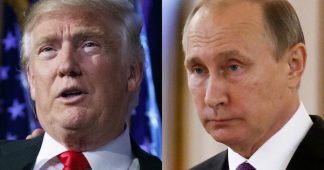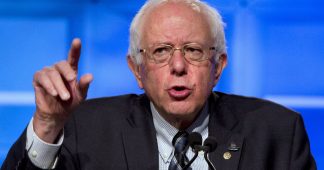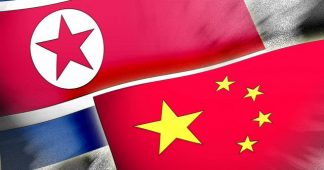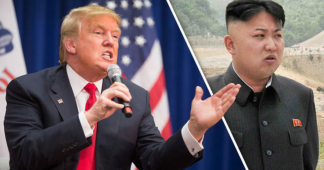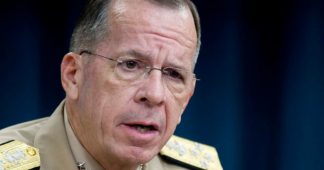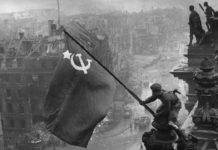The last war game, however, was the most shocking of them all. We assumed a similar scenario, with allied forces preparing for a possible invasion, but this time Kim decides to launch a preemptive attack on the U.S. homeland—to take as many people to the grave with him as possible, a goal the North Koreans have declared in the past. In this last war game, North Korea attacks the cities in the second scenario with atomic weapons, but also launches successful nuclear strikes on Los Angeles, San Francisco, Seattle and Portland. We were shocked to discover that the combined body count, across Asia and America, came to over three million people—before America’s nuclear counterattack, which would add millions more. After North Korea retaliates with every weapon it has, launching more nuclear attacks along with chemical- and biological-weapons strikes, eight million people have lost their lives.
A SPECTER is haunting Washington—the specter of nuclear war with North Korea. The idea that the Trump administration should endorse a military solution—and a full-blown war if necessary—to degrade or destroy North Korea’s nuclear-weapons program is acquiring a new prominence. Advocates of war argue that the time to hit North Korea is now. They say that time is running out, and that Pyongyang will soon perfect its ability to attack America. Their contention is that America can knock out North Korea’s nuclear program with some “shock and awe”–style bolt from the blue. Finally, they say that a war “over there” would be better than the death of innocent Americans “over here.”
Such thinking is redolent of the Iraq War. Just as the war in Iraq evaded the prediction that it would be a “cakewalk,” so a conflict over North Korea would likely issue in a calamity. There is no widespread public support, as a recent Washington Post–ABC News poll indicates, for a preemptive American strike on North Korea: 67 percent of Americans say Washington should act only if North Korea attacks it or our allies first. Before Washington experiences a fresh spasm of war fever on the Potomac, it’s imperative to examine just why a conflict with North Korea is inimical to America’s national interest. For the notion that America can “totally destroy” North Korea, as President Trump put it, with impunity is not quite persuasive. The result could even be a wider conflict, one that draws in great powers such as Russia and China that would seek to defend what they perceive as their own national interests.
Today, we live an age where America’s greatest strategic advantage—two big oceans that protect us from the great geopolitical struggles in Europe and Asia, both past and present—is no longer the strategic safety blanket it once was, thanks to modern missile technology. Put simply, while the American military is the most destructive force ever devised in human history, such a force cannot guarantee that Washington will eliminate every single North Korean nuclear weapon. Nor can we ensure that if Pyongyang retaliates, potentially with whatever nuclear weapons we miss, that our missile defenses can keep us safe. Quite the contrary.
The truth is that a war with North Korea could be nothing like the First Gulf War, Yugoslavia, Kosovo, Afghanistan, the Second Gulf War or Libya. Such a conflict could be an epic struggle in which millions of people, on the Korean Peninsula, in Japan and even in the continental United States, could perish. The best path forward is to practice the foreign-policy doctrine that ended the Cold War peacefully: containment. Containment, rather than open conflict or outright appeasement, is not a panacea, but under the circumstances it is the best of the options that Washington can pursue. As during the Cold War, a patient and vigilant strategy can wait out a hostile regime in the expectation that it will eventually crumble. A look at the possible outcomes of a nuclear conflict shows why it is more prudent to adopt this approach than to strike first.
WHEN WE consider the possibility of a military operation against North Korea, it is helpful to take a step back and consider from Pyongyang’s perspective how it might respond. North Korean leader Kim Jong-un may not wish to counter such a strike by using the full range of his military options, fearing such an attack could unleash his worst fear: regime change.
This is where U.S. military planners begin to get nervous, as North Korea—even despite having an army that looks more like it was outfitted in the 1950s—has many ways to keep us guessing militarily. Kim could opt for less conventional means to instill fear and panic, attacking in an asymmetric manner that would be hard to counter.
